Skills initiatives are front and center for many leadership teams today, and some organizations are investing significant time and resources. But beware!
Whatever work you do to get leaders behind skill development, whatever resources you secure for learning, and whatever successes you see with retention or innovation—everything eventually falls apart if your efforts lack skill coaching.
To lean into skill coaching, you’ll need to prioritize skill-building opportunities and lean on the managers who oversee employee learning. Unfortunately, our research shows that 26% of employees say their managers don’t support their professional growth, and nearly half of employees aren’t connected to work that stretches their skills.
“Most managers want to help their employees develop skills, but many managers have not received great coaching themselves,” said Ben Cowan, Director of Skills Strategy at Degreed. “They need training on how best to drive skill success, time and resources to do it right, and recognition that their skill coaching efforts are critical to the success of the business.”
Here’s why—and how—L&D can help managers be better skill coaches to help achieve critical company skill goals.
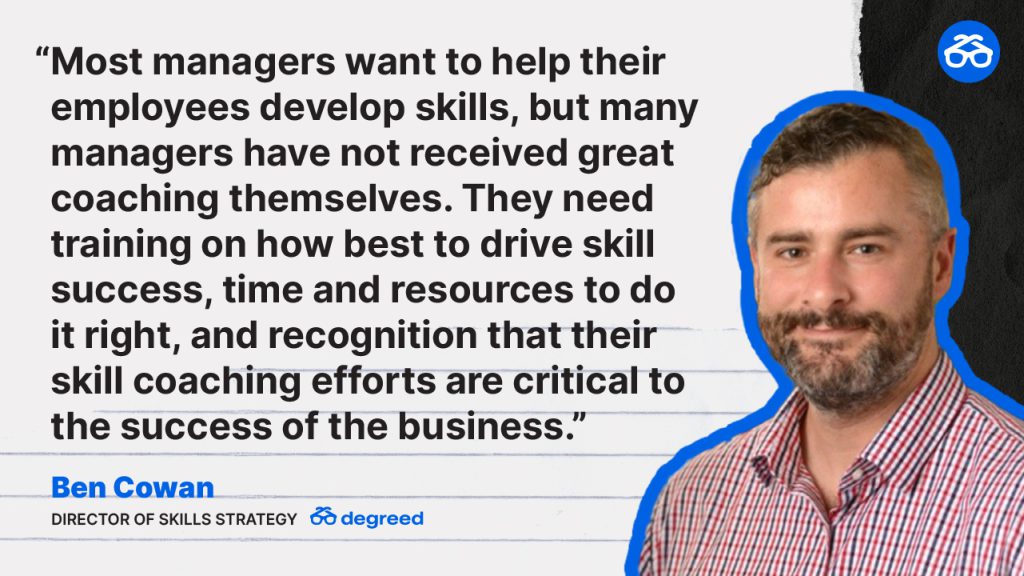
Why Managers Should be Skill Coaches
Ideally, managers have a profound and positive effect on employees in all aspects of their work, especially in learning. In a positive learning culture, people are 92% more likely to say their manager supported their development.
Our research also shows that 18% of employees say one of their favorite ways to learn is directly from their managers. Furthermore, 70% of employees learn from managers frequently, and 28% learn from managers daily.
And can you imagine implementing experiential learning like special projects, mentorships, and internal internship programs without manager support? We can’t. In fact, we’ve found that the most successful learning happens at companies where managers are excellent skills coaches.
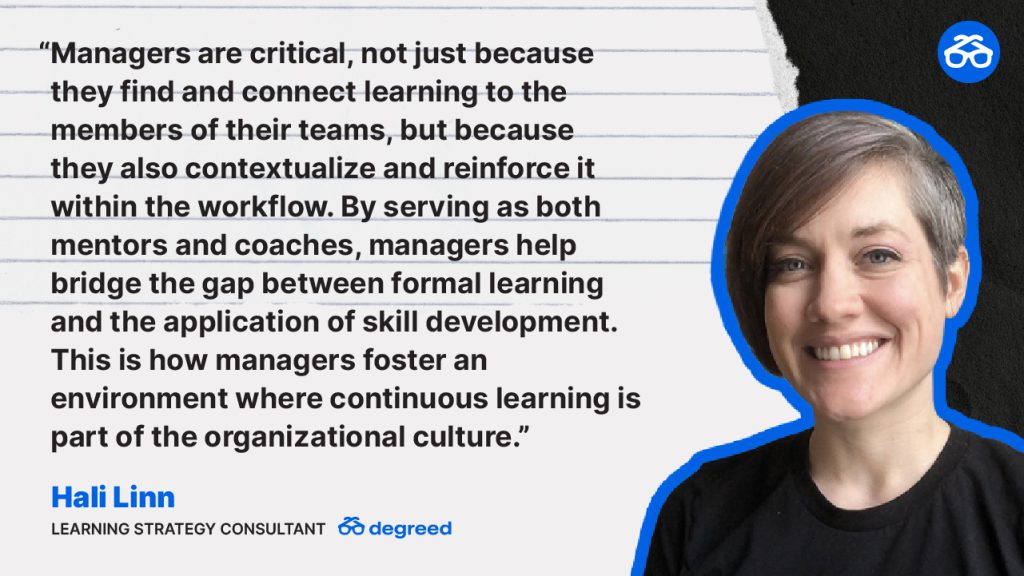
“Managers are critical, not just because they find and connect learning to the members of their teams, but because they also contextualize and reinforce it within the workflow,” said Hali Linn, Learning Strategy Consultant at Degreed.
“By serving as both mentors and coaches, managers help bridge the gap between formal learning and the application of skill development. This is how managers foster an environment where continuous learning is part of the organizational culture.”
Managers are also critical to everything else in your company—operations, productivity, employee engagement, and more. And that’s a problem. Why? Because managers are time-starved, caught between competing priorities, and missing critical guidance. They need support too, and that’s where L&D comes in. Here’s how you can help.
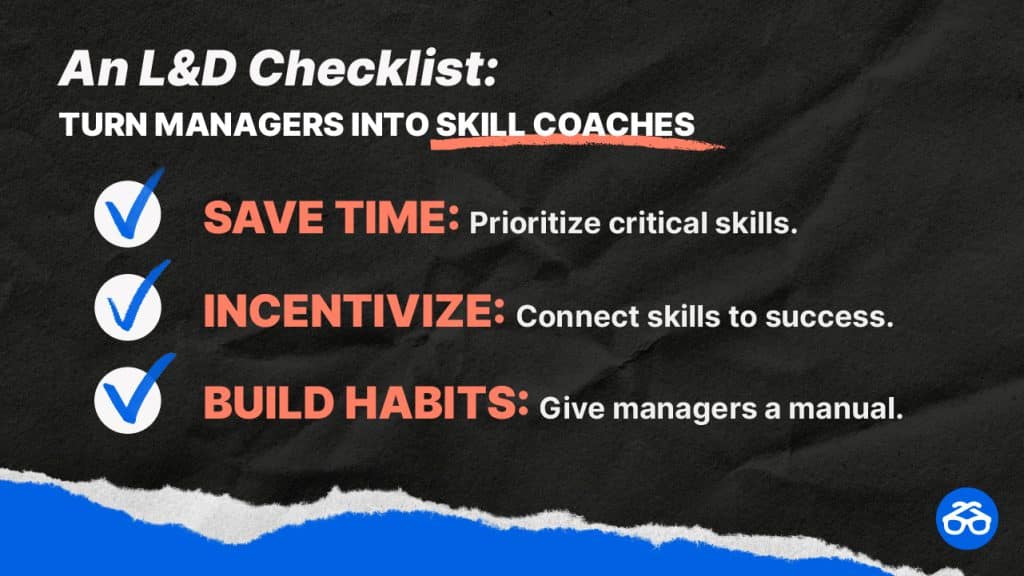
No 1. Save managers time: prioritize critical skills.
Research shows the average manager already spends 30 minutes with each direct report every three weeks, and great managers spend even more. If your organization is anything like those studied, it means managers are some of the busiest people in your company.
So if you ask a manager to add more skills development to their plate, don’t be surprised if you get the corporate equivalent of a shrug.
Also consider that the number of tasks skill coaches could add to their plates—from discussing career goals and giving feedback to finding and assigning stretch projects—can quickly become overwhelming. Now multiply that by the number of direct reports and the number of skills each direct report needs to develop.
It becomes clear that this is going to be a lot of work. This means that, if you want skills coaching to succeed, you’ll need to remove as many multipliers that you can and shorten the list of skills.
3 Ways to Help Managers Prioritize Critical Skills
To keep managers (and employees) from feeling overwhelmed, help them narrow their focus to the most important skills.
Which skills will have the most impact? Your managers may not know or have time to find out. But you can help them prioritize in one of three ways:
- Top-down: Translate business objectives into high-priority skills using the first part of our workbook How to Win Learning and Influence the C-Suite.
- Bottom-up: Democratize skill prioritization by asking individual contributors which skills would help them in their daily work.
- Combination: Give managers and employees a list of high-priority skills from the business—then let them decide what to learn first.
“A combination approach has worked well for many of our clients,” said Stephanie Lyras, Director, Change Management, Engagement & Adoption. “It allows us to be clear about the skills most important at an organizational level, while respecting the need for flexibility and autonomy to focus on the aspects of the global strategy that are most critical for different business areas.”
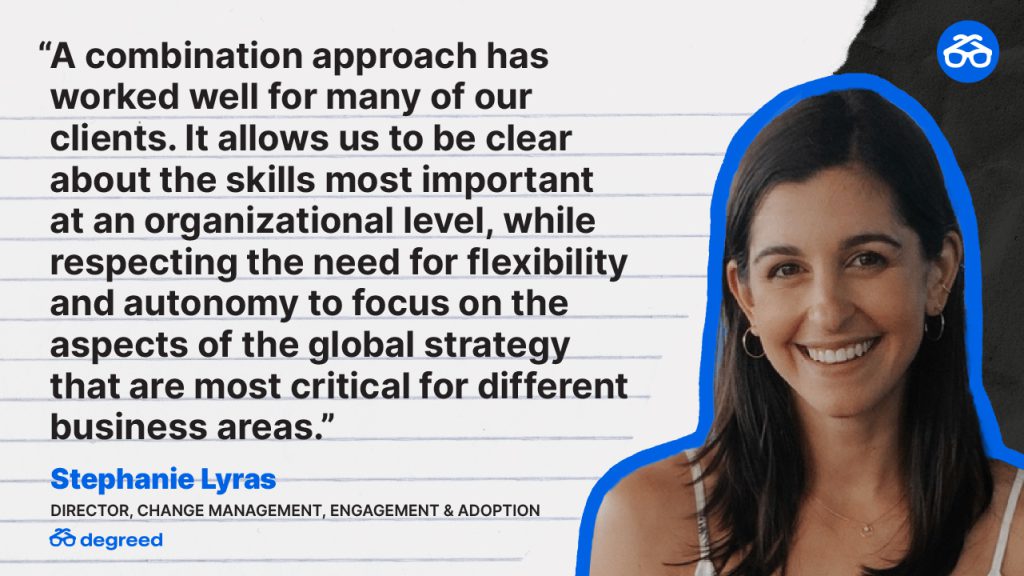
No 2. Incentivize managers: connect skills to successes.
Executives need to drive profit. Managers need to show impact. Employees need to provide quality work. Everyone wants your company to succeed. It’s your job in L&D to bring them together.
If you’ve prioritized skills using a top-down or combination approach, you’ve already aligned with the C-suite on skills. When you share these priorities with skill coaches, connect those coaches to available resources, pathways, and tools. Give them ready-made learning packages.
If you’ve taken more of a democratized approach to skill prioritization, coordinate efforts across teams. Pool resources to share among multiple teams—and provide the social learning that 75% of workers crave.
Celebrate the wins.
However you help managers prioritize skills, keep the focus dialed and the energy high by celebrating wins. Simply pointing out skills and expecting managers to take it from there won’t cut it. Prove to them that the skills highlighted will help them succeed.
Celebrate team members who complete stretch assignments related to high-priority skills. Track progress like increases in productivity, quality improvements, and skills assessments—and share them often. You’ll help reinforce that skills development is part of success, not incidental to it.
No 3. Build habits: give managers a manual.
Coaching is a skill like any other, and even the most seasoned managers need help leveling up their workers. L&D can help by infusing more conversations with skills terminology, creating new guidance, and leveraging learning tools.
Add skills conversations to existing guidance.
There are already existing processes in place at your company:
- Most managers address employee development and performance with evaluations, career development conversations, and annual reviews.
- Most executives likely already schedule recurring company events like strategy rollouts and quarterly kick-offs.
Your job is to ensure that these practices address skill-building. Work with HR and Talent executives to make discussions about skills a part of performance evaluations and raises. Provide skills talking points for career development conversations.
For example, you could add a task at the end of existing coaching or performance evaluation forms to align two priority skills to work on—and outline how progress in those skills will be measured at the next evaluation.
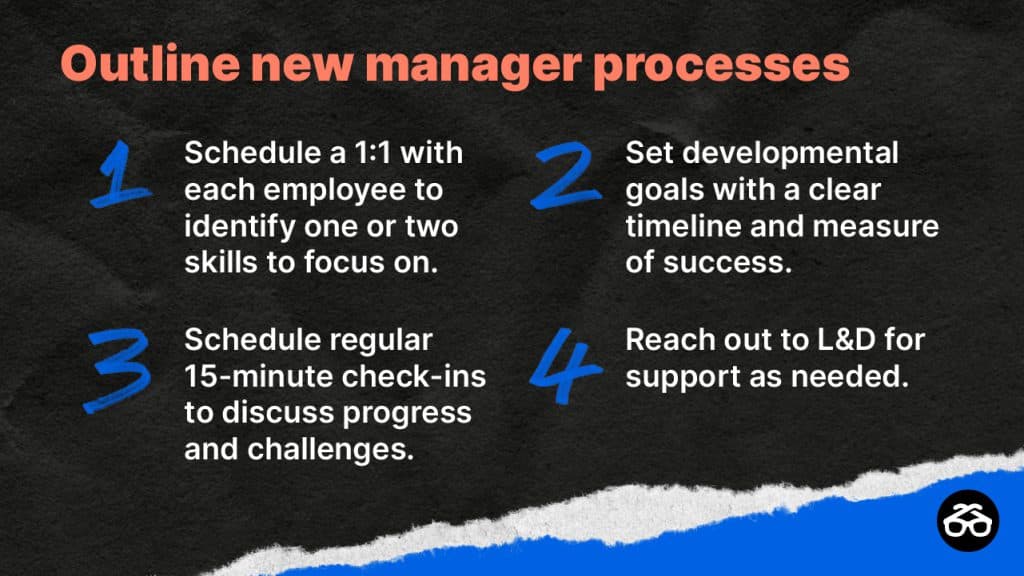
Create new guidance.
After incorporating more skill coaching language in existing processes, start outlining the specifics of new processes that help managers get the most out of the time they spend on skill coaching.
For example, managers coaching each direct report can:
- Schedule a 1:1 with the employee to identify one or two skills to focus on.
- Set developmental goals with a clear timeline and measure of success.
- Schedule regular 15-minute check-ins to discuss progress and challenges.
- Reach out to L&D for support as needed.
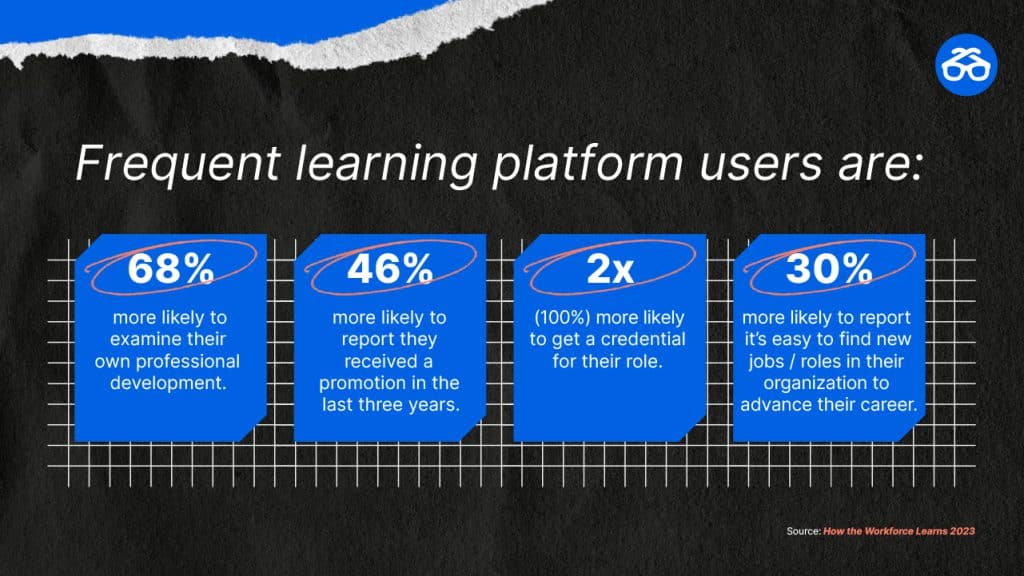
Help managers leverage learning tools.
With the rise of learning technologies, AI, and vast content libraries, employees have more ways than ever to develop their skills. But without manager guidance, even the most advanced technologies are reduced to tools that sit on a shelf.
Letting learning tools sit on the shelf is a mistake. Gartner research shows that managers who connect employees to the right resources at the right time see 26% more performance and 3x the likelihood their employees will be high performers.
Managers need to be empowered to become skill coaches and be the connectors between those technologies and employee skill development. Help managers understand how L&D resources make skill coaching easier.
Focus on tools like these if you have them:
Degreed Skill Coach
Managers use Degreed Skill Coach to help track and analyze the skills their team members have—and to understand the gaps. Managers see employee skills ratings and set developmental goals.
“Managers don’t often know where to start when it comes to facilitating coaching conversations,” Linn said. “But Degreed Skill Coach is designed for just that, a place to start. Skill Coach gives managers the view of their team member’s skills, where they want to focus their development, and how to help them achieve their goals.”
Degreed Focus Skills
Degreed Focus Skills presents employees with learning and skill-building content based on relevance to their work, company, and manager goals.
“So often we, as L&D admins, get a bit too excited about selecting a bunch of skills for employees to focus on,” Linn said. “But the truth is that often leads to overwhelm, and employees tune out. Managers helping their teams choose just a few skills to intentionally work on is what yields results. Too many and employees will disengage.”
Degreed Button
Degreed Button is a plug-in managers use to share learning content on the fly.
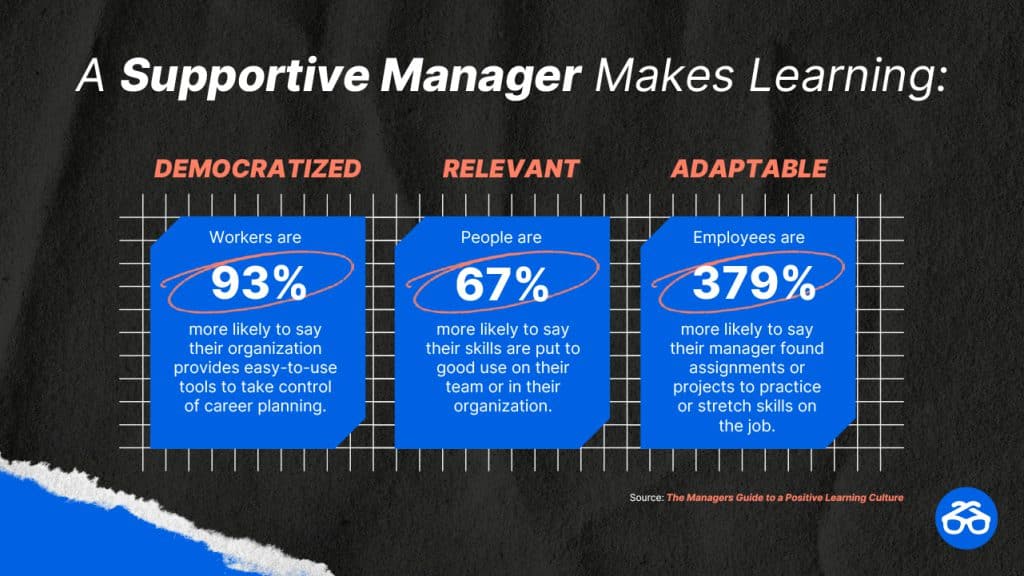
Everybody needs a coach.
Turning managers into skill coaches is critical for skills development. With coaching, employees are 93% more likely to use career planning tools, 67% more likely to use skills, and 379% more likely to have opportunities to stretch their skills on the job.
Coaching itself is a skill, and it’s one L&D can cultivate by giving managers the support they need to succeed. And if you find yourself in need of a little coaching, Degreed can help with that. Our Professional Services team partners with L&D professionals like you to explore your learning strategy, technology goals, and questions about coaching managers. Book a free, private consultation.

Contributors

Director of Skills Strategy at Degreed

Skills & Talent Expert at Degreed

Director of Change Management, Engagement, and Adoption at Degreed
